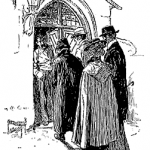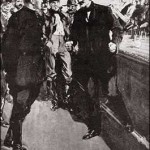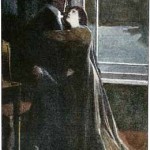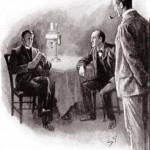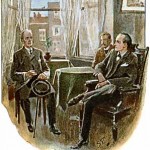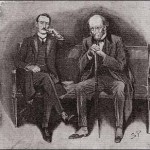“A singular set of people, Watson–the man himself the most singular of them all. I managed to see him on a plausible pretext, but I seemed to read in his dark, deepset, brooding eyes that he was perfectly aware of my true business. He is a man of fifty, strong, active, with iron-gray hair, great bunched black eyebrows, the step of a deer and the air of an emperor–a fierce, masterful man, with a red-hot spirit behind his parchment face. He is either a foreigner or has lived long in the tropics, for he is yellow and sapless, but tough as whipcord. His friend and secretary, Mr. Lucas, is undoubtedly a foreigner, chocolate brown, wily, suave, and catlike, with a poisonous gentleness of speech. You see, Watson, we have come already upon two sets of foreigners–one at Wisteria Lodge and one at High Gable–so our gaps are beginning to close.
“These two men, close and confidential friends, are the centre of the household; but there is one other person who for our immediate purpose may be even more important. Henderson has two children–girls of eleven and thirteen. Their governess is a Miss Burnet, an Englishwoman of forty or thereabouts. There is also one confidential manservant. This little group forms the real family, for they travel about together, and Henderson is a great traveller, always on the move. It is only within the last weeks that he has returned, after a year’s absence, to High Gable. I may add that he is enormously rich, and whatever his whims may be he can very easily satisfy them. For the rest, his house is full of butlers, footmen, maidservants, and the usual overfed, underworked staff of a large English country house.
“So much I learned partly from village gossip and partly from my own observation. There are no better instruments than discharged servants with a grievance, and I was lucky enough to find one. I call it luck, but it would not have come my way had I not been looking out for it. As Baynes remarks, we all have our systems. It was my system which enabled me to find John Warner, late gardener of High Gable, sacked in a moment of temper by his imperious employer. He in turn had friends among the indoor servants who unite in their fear and dislike of their master. So I had my key to the secrets of the establishment.
“Curious people, Watson! I don’t pretend to understand it all yet, but very curious people anyway. It’s a double-winged house, and the servants live on one side, the family on the other. There’s no link between the two save for Henderson’s own servant, who serves the family’s meals. Everything is carried to a certain door, which forms the one connection. Governess and children hardly go out at all, except into the garden. Henderson never by any chance walks alone. His dark secretary is like his shadow. The gossip among the servants is that their master is terribly afraid of something. ‘Sold his soul to the devil in exchange for money,’ says Warner, ‘and expects his creditor to come up and claim his own.’ Where they came from, or who they are, nobody has an idea. They are very violent. Twice Henderson has lashed at folk with his dog-whip, and only his long purse and heavy compensation have kept him out of the courts.
“Well, now, Watson, let us judge the situation by this new information. We may take it that the letter came out of this strange household and was an invitation to Garcia to carry out some attempt which had already been planned. Who wrote the note? It was someone within the citadel, and it was a woman. Who then but Miss Burnet, the governess? All our reasoning seems to point that way. At any rate, we may take it as a hypothesis and see what consequences it would entail. I may add that Miss Burnet’s age and character make it certain that my first idea that there might be a love interest in our story is out of the question.
“If she wrote the note she was presumably the friend and confederate of Garcia. What, then, might she be expected to do if she heard of his death? If he met it in some nefarious enterprise her lips might be sealed. Still, in her heart, she must retain bitterness and hatred against those who had killed him and would presumably help so far as she could to have revenge upon them. Could we see her, then and try to use her? That was my first thought. But now we come to a sinister fact. Miss Burnet has not been seen by any human eye since the night of the murder. From that evening she has utterly vanished. Is she alive? Has she perhaps met her end on the same night as the friend whom she had summoned? Or is she merely a prisoner? There is the point which we still have to decide.
“You will appreciate the difficulty of the situation, Watson. There is nothing upon which we can apply for a warrant. Our whole scheme might seem fantastic if laid before a magistrate. The woman’s disappearance counts for nothing, since in that extraordinary household any member of it might be invisible for a week. And yet she may at the present moment be in danger of her life. All I can do is to watch the house and leave my agent, Warner, on guard at the gates. We can’t let such a situation continue. If the law can do nothing we must take the risk ourselves.”
“What do you suggest?”
“I know which is her room. It is accessible from the top of an outhouse. My suggestion is that you and I go to-night and see if we can strike at the very heart of the mystery.”
It was not, I must confess, a very alluring prospect. The old house with its atmosphere of murder, the singular and formidable inhabitants, the unknown dangers of the approach, and the fact that we were putting ourselves legally in a false position all combined to damp my ardour. But there was something in the ice-cold reasoning of Holmes which made it impossible to shrink from any adventure which he might recommend. One knew that thus, and only thus, could a solution be found. I clasped his hand in silence, and the die was cast.
But it was not destined that our investigation should have so adventurous an ending. It was about five o’clock, and the shadows of the March evening were beginning to fall, when an excited rustic rushed into our room.
“They’ve gone, Mr. Holmes. They went by the last train. The lady broke away, and I’ve got her in a cab downstairs.”
“Excellent, Warner!” cried Holmes, springing to his feet. “Watson, the gaps are closing rapidly.”
In the cab was a woman, half-collapsed from nervous exhaustion. She bore upon her aquiline and emaciated face the traces of some recent tragedy. Her head hung listlessly upon her breast, but as she raised it and turned her dull eyes upon us I saw that her pupils were dark dots in the centre of the broad gray iris. She was drugged with opium.

